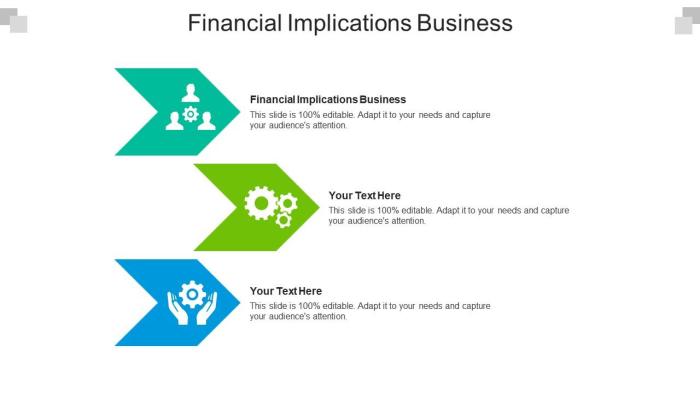Yo, diving into the world of Financial implications of owning a business, we’re about to break it down for you in a way that’s fresh and engaging. Get ready for some real talk about the money game in the business world.
In this guide, we’re going to lay out all the details about start-up costs, operating expenses, and cash flow management that every business owner needs to know. So, buckle up and let’s roll!
Overview of Financial Implications
Financial implications in the context of owning a business refer to the potential consequences and effects that financial decisions and actions can have on the overall financial health and sustainability of the business. Understanding these implications is crucial for business owners as it helps them make informed decisions, manage risks, and ensure the long-term success of their business.
Importance of Understanding Financial Implications
- Financial implications impact cash flow: Changes in revenue, expenses, or investments can directly affect the cash flow of a business, making it essential for owners to anticipate and plan for these implications.
- Strategic decision-making: Knowing the financial implications of different choices allows business owners to make strategic decisions that align with their goals and objectives, ultimately driving the growth and profitability of the business.
- Risk management: Understanding financial implications helps in identifying and mitigating potential risks that could threaten the financial stability of the business, such as taking on too much debt or overspending on non-essential expenses.
Examples of Common Financial Implications
- Investment decisions: Deciding whether to invest in new equipment, technology, or expansion projects can have significant financial implications on the business, impacting cash flow, profitability, and long-term growth.
- Cost control: Managing operating expenses, such as rent, utilities, and salaries, is crucial as overspending can lead to financial strain and impact the overall financial health of the business.
- Debt management: Taking on debt through loans or credit lines can have both positive and negative financial implications, affecting interest payments, creditworthiness, and overall financial stability.
Start-up Costs
Starting a business involves various start-up costs that can impact the financial health of the venture. These costs are essential for getting the business up and running smoothly.
Types of Start-up Costs
- Equipment and Supplies: Purchasing necessary tools, machinery, and materials to operate the business.
- Legal and Registration Fees: Costs associated with registering the business, obtaining licenses, and legal fees.
- Marketing and Advertising: Promotional expenses to create awareness and attract customers to the business.
- Rent and Lease Payments: Costs for renting or leasing a physical space for the business.
- Employee Salaries and Benefits: Initial costs for hiring and compensating employees.
Impact of Start-up Costs
Start-up costs can significantly impact the financial health of a business, especially in the early stages. High start-up costs can lead to cash flow challenges and strain the business’s resources.
Comparison of Start-up Costs
| Online Business | Brick-and-Mortar Business |
|---|---|
| Lower start-up costs as there is no need for physical location or inventory. | Higher start-up costs due to the need for renting or purchasing a physical space and inventory. |
| Investment in website development and online marketing. | Investment in store design, renovations, and display. |
| Less overhead costs related to utilities and maintenance. | Higher overhead costs for utilities, maintenance, and security. |
Operating Expenses

In running a business, operating expenses are the ongoing costs incurred to keep the business operational on a day-to-day basis. These expenses are essential for maintaining the business and are distinct from start-up costs.
Types of Operating Expenses
- Rent and lease payments
- Utilities (electricity, water, internet)
- Salaries and wages
- Inventory costs
- Marketing and advertising expenses
Strategies for Managing and Reducing Operating Expenses
- Regularly review expenses and look for cost-saving opportunities
- Negotiate with suppliers for better rates
- Implement energy-saving practices to reduce utility bills
- Outsource non-core activities to reduce labor costs
- Invest in technology to streamline processes and reduce manual labor
Impact of Operating Expenses on Profitability
Operating expenses directly affect the profitability of a business. High operating expenses can eat into profits, making it crucial for business owners to manage these costs efficiently. By controlling and reducing operating expenses, businesses can improve their bottom line and increase profitability in the long run.
Cash Flow Management
Cash flow management is a crucial aspect of running a successful business. It involves monitoring the flow of money in and out of the business to ensure that there is enough cash on hand to cover expenses and invest in growth opportunities. Effective cash flow management is essential for financial stability and long-term success.
Importance of Cash Flow
- Regularly monitor cash flow: Keep track of when money is coming in and going out to anticipate any potential cash shortages.
- Forecast cash flow: Use historical data and future projections to predict cash flow patterns and plan accordingly.
- Manage accounts receivable and accounts payable: Ensure that payments are collected on time and negotiate favorable payment terms with suppliers.
- Build a cash reserve: Set aside a portion of profits as a cash reserve for emergencies or unexpected expenses.
Consequences of Poor Cash Flow Management
- Insufficient funds to cover expenses: If cash flow is mismanaged, a business may struggle to pay bills, employees, or suppliers.
- Missed growth opportunities: Without proper cash flow management, a business may miss out on opportunities to invest in expansion or new projects.
- Increased debt: Inadequate cash flow can lead to borrowing to cover expenses, resulting in additional interest payments and financial strain.
- Damaged relationships: Late payments to suppliers or employees can harm relationships and impact the reputation of the business.
